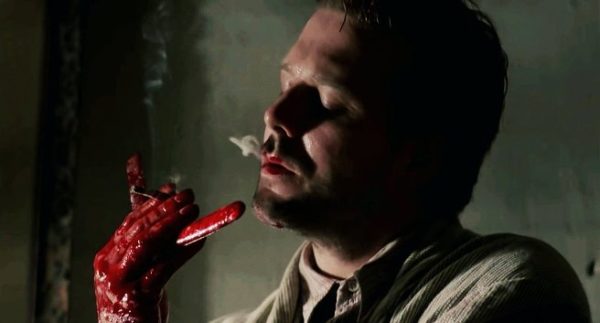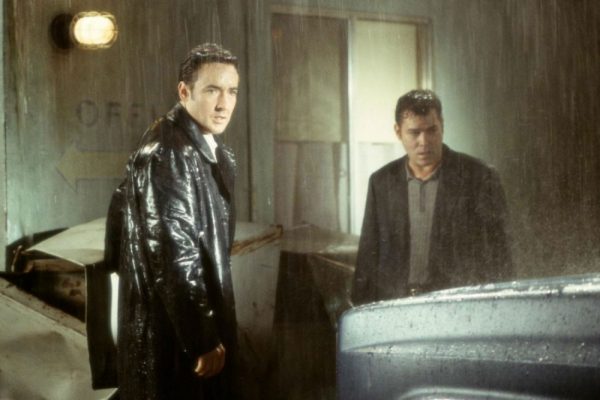Tom Jolliffe looks at the search for self in cinema, when repression, mental illness or physical ailments blind a protagonist from the chilling truth… they are the villain.

I love a cinematic Detective yarn. A typically weary, clearly damaged protagonist is sent on a mission to find an elusive figure, be it a murderer, or someone who has seemingly disappeared. Typically of course, our protagonist is in the side of good and inevitably catches their target. There’s been a twist on that well trod path though. Occasionally our protagonist slowly unearths the clues, coming to the shocking conclusion that they are the person they seek. Perhaps even this twist on the formula has now been trod itself to the point it’s also formulaic, but regardless, there have been a number of great examples of films where our intrepid detective must eventually look within to find their answer.

In 1987’s Angel Heart, Mickey Rourke plays Harry Angel, a PI sent by Louis Cyphre to find a missing Jazz musician called Johnny Favorite. Cyphre is owed a large debt, and wants Favorite found. In retrospect, the late Alan Parker does offer plenty of clues along the way and perhaps teases his cards a tad too much early on, as Angel muses on his time in the war, and some injuries that got him ‘all fucked up.’ Likewise Angel deals with the mysterious and devilish Lou Cyphre (Lucifer, in case you missed that but you probably didn’t), as well as a character called Epiphany. Parker’s grimy and atmospheric thriller is always intriguing and engrossing however, and Rourke gives a great performance that encapsulated the intensity and talent he had during his early years. That he didn’t become the next De Niro was disappointing perhaps, but his complicated Hollywood history is well documented. The immense talent however, was never in doubt. By the end, Angel realises he is in fact Favorite, having tried to escape a pact with the devil for his earthly soul by staging his own disappearance and taking on the identity of a WWII soldier returning home (with a little amnesia thrown in for good measure).

Christopher Nolan’s breakout hit and almost instant cult classic, Memento, probably remains his best. Amnesia strikes again here as Guy Pearce plays Leonard Shelby, a head injury victim with anterograde amnesia on the hunt for the man who killed his wife (and also injured him). The genius of Memento is in the structure. Nolan begins at the end, with the killer tracked and killed, then plays the film in reverse chronological order (with a few other structure breaks beyond, that Nolan infamously tried to explain with a canvass sheet and a pen once). As Shelby uses notes, post-its and more extremely, body tattoos, to hold important information, we see how easily these can be corrupted or twisted. Once a secondary, seemingly unrelated character, Sammy Jankis is revealed, it will inevitably have some relevance. As we discover at the end (beginning), this isn’t Shelby’s first run at solving his wife’s murder, nor the first time he inevitably discovers that there was no murderer. He’s been chasing himself, and the tragic tale of amnesiac, Sammy, whose wife tested his ailment after crippling self doubt (by having him repeatedly give her insulin injections) and died, is really his own story. The beauty of this film is not just how the amnesia makes Shelby/Jankis an unreliable narrator, but how Nolan still manages to logically work in a dose of repression to, and this complex need for Shelby to have this mission over and over again.
James Mangold delivered Identity in 2003. What begins as a seemingly implausible set of circumstances brings a group of strangers together at a rain swept motel. One woman is mortally wounded after being struck by the car of former detective turned driver, Ed (John Cusack). Included among them is a has been actress, runaway young newlyweds, a small town girl whose failed life in the big City sees her return home, a morally ambiguous detective and the psychotic patient he’s transporting (Among others). Unable to call out or get out, they’re trapped and then one by one, picked off by an unknown killer. For Mangold it was an early sign on the kind of ability he has to grip an audience and build atmosphere. The engaging cast, including Cusack, Ray Liotta, Amanda Peet and John Hawkes, as well as a constant visual gloss of night and perpetual rain keep the film interesting. By the time the clues form to reveal that the motel is the mental construct of a psychotic patient on death row, and the inhabitants of the odd murder mystery are in fact his split personalities, the film almost threatens to derail. That big twist perhaps comes too early, as with some self awareness now, our patient is allowed to retreat back to his inner delusion and allow the case to be played out and sold, so the murderous part of his mind can be ‘caught’ and dealt with. Identity in fact, though dealing with these interesting ideas of repression, psychotic delusion and deranged alter-egos, kind of goes too far and the finale doesn’t work as well as leaving the twist till closer to the end.

Shutter Island has many similarities with Identity, where a psychiatric patient with a history of killing (though in the case of Identity, he’s a serial killer) is given license by those he’s in care of, to play out a detective’s case in order to discover a truth he can’t accept. Teddy killed his wife, who had a mental breakdown and killed their children. It’s not merely the fact he killed her that he needs to repress of course, but also what she did. Something he tries to block out tragically. Scorsese manages to take us on one of the most intriguing journeys of all, and fires out little teases skillfully. Everything from jolting moments of what look like continuity error, are intentional and teasing, right up until the moment Teddy Daniels realises the escaped asylum patient he’s hunting is himself. Not content with letting it finish on that discovery, Martin Scorsese then throws in the unforgettable final moment where Daniels feigns a regression and seals his own lobotomy. For him it’s a release, a final freedom from an unshakable knowledge of the tragedy that struck his life. “Which would be worse? To live as a monster or to die as a good man?”

Leonardo DiCaprio touched similar ground in Inception, which also required our protagonist to delve deep within to uncover the repressed tragic secrets locked within. Christian Bale also did the same in The Machinist too, among many great examples. Bale is exceptional in fact, one of the early indicators of just what extreme lengths Bale will go to for a role. There’s nothing more complicated than the human mind and its inherent fragility. It’s what makes these cerebral cinematic journeys so intriguing. What are your favourite films with protagonists unknowingly searching for themselves? Let us know on our social channels @flickeringmyth.
Tom Jolliffe is an award winning screenwriter and passionate cinephile. He has a number of films out on DVD/VOD around the world and several releases due out in 2021/2022, including, Renegades (Lee Majors, Danny Trejo, Michael Pare, Tiny Lister, Nick Moran, Patsy Kensit, Ian Ogilvy and Billy Murray), Crackdown, When Darkness Falls and War of The Worlds: The Attack (Vincent Regan). Find more info at the best personal site you’ll ever see here.












